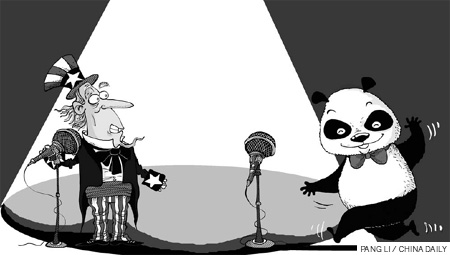A visit of historic proportions

It can be said with a degree of certainty that President Hu Jintao's state visit to the United States from Jan 18 to 21 was historic, because in a sense it returned China to the center of the world stage, which it had occupied for centuries.
Never before has a Chinese head of state been accorded such a stately and ceremonial welcome. Guests at the glittering, star-studded state dinner were dazzled by US First Lady Michelle Obama's red silk dress. The first lady's choice of color, according to media reports, had a special message signifying the importance of the event.
Symbols matter in diplomacy, and symbolism abounded during Hu's four-day visit to the US. President Barack Obama entertained his Chinese counterpart at a private dinner on his arrival in Washington on Jan 18. Only six people, three from each side, attended the informal dinner. It was a symbol of closeness and a gesture of friendship demonstrated by the host. And it was different from the hospitality accorded to Hu during his visit to Washington in 2006, when his host - George W. Bush - treated the state guest to a White House lunch.
Why this contrast? Well, a lot has changed in five years. China today is not what it was five years ago, and the same applies to the US, though in a different way. In 2006, China was the fourth largest economy in the world in terms of GDP; China's GDP then was less than 20 percent of America's. In 2010, China overtook Japan as the world's second largest economy, and its GDP was close to 40 percent of America's.
Besides, China today has become America's largest creditor, holding Treasuries worth $61.7 billion. In 2006, America's national debt was less than half of today's $14 trillion and its housing bubble had not burst.
China's stunning rise, from a struggling economy three decades ago when its per capita GDP was barely $200, to an economic powerhouse and export dynamo has elevated it to the center of the world stage. The Hu-Obama summit and the euphoria around Hu's visit reflect China's new and deserving status.
Back in 1972, former US president Richard Nixon described his ice-breaking visit to China as "seven days that changed the world". He was right. He knocked open China's door and changed the equation of the Cold War. It would thus be no exaggeration to say that Hu's four-day visit to the US will have a major effect on the course of Sino-US relations in the 21st century.
 0
0 






